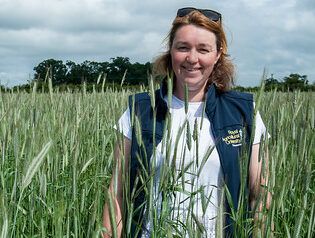UK summer wash-out causing major problems for farmers

Excessive rainfall across the UK since the start of July is now starting to cause big problems for UK farmers, according to the Royal Agricultural University in Cirencester.
As well as trying to find enough dry weather to harvest fields of wheat, barley, and other crops which are ready to be combined, many farmers have not even been able to make hay yet this year.
Professor Nicola Cannon, Professor of Agriculture at the Royal Agricultural University, said: “This year, the usual summer schedules of many UK farmers have been seriously affected by the unseasonal weather.”
Many farmers do not cut their hay in early summer as they have signed up to an environmental scheme, called Mid Tier, which prohibits cutting hay before July 1 to allow plants to flower and set seed.
However, this year there have been very few sequential dry days since July 1, giving farmers insufficient time to cut the grass, spread it out, allow it to dry, row it up again, and then bale it before it rains again.
Those farmers not signed up the scheme were able to cut and bale their hay in mid to late June, when the weather was hot and dry, but for those who did delay there is now a real problem.
“Excessively wet or dry conditions impact how plants grow, ripen and store, which then in turn affects how they taste for humans and animals,” said Nicola. “Even if the product is being harvested to be used for animals, it still needs to store well without going mouldy as this not only reduces the quality and desirability of the product but also can make it a fire risk.
“We all know the phrase ‘make hay while the sun shines!’.
"The reason for this is that ideally grass is cut for hay and dries quickly on a warm and breezy day. It is no different to drying your laundry on a washing line - the thicker and the wetter the clothes, and the stiller or duller the weather, the longer it takes for them to dry.”
Farmers make hay to store the spring grass in a stable form to feed to livestock in the winter months when the grass is not growing and food is in short supply. In the UK, hay is traditionally made in July when the grass has set seed but before all the seeds drop and the leaves die which causes in a big drop in the nutritional quality of the hay.
Nicola added: “If hay gets rained on when it is cut, it needs to be spread out again and left for longer, to allow it to dry completely. If the wet grass lies in the field for too long before being baled, it can start to ferment which not only reduces palatability but also creates heat which can lead to a risk of barn fires.”
Many farmers have moved from hay making to making silage as that is not so dependent on a dry weather window. Silage is baled at a higher moisture content and either put in a silage clamp, or tightly baled, to exclude air and allow anaerobic bacteria to colonise the crop and produce lactic acid which lowers the pH of the grass.
However, some farms have continued to make hay as it is generally preferred by the horse and sheep sectors and can conveniently be made into small bales which do not require machinery to handle.
Others make hay as they have chosen to manage their fields to improve biodiversity by allowing the grasses and other species in the field to flower and set seed and there are even payments available to encourage farms to adopt these more traditional techniques.
With the continuing wet weather, farmers are also now facing the same problems harvesting their grain crops.
Nicola continued: “The dry weather in late June this year saw a very early start to harvest for some farmers but in higher areas, such as where the RAU is in the Cotswolds, the crops were not fully ripe at this time.
“Normally winter-sown barley is the first to be ready to harvest and, as well as grain, it produces high quality straw for livestock bedding and feed. After winter barley, oilseed rape is harvested which is very vulnerable to pod shatter which can happen if it rains heavily when it is ripe and ready to harvest and can result in serious yield loss.
“This time of year is when farmers need to harvest winter wheat, which is used for either animal feed or for making biscuits or bread, but the quality of the grain can be seriously damaged if the ripe wheat crop remains in the field because it is too wet to harvest.
“Grain that remains unharvested in the field in wet weather can start to sprout and is more likely to develop mould, both of which can lead to it being rejected for breadmaking meaning the farmer then receives a lower price.
“In very wet and windy conditions – such as those we have been experiencing lately - the crop may fall over, known as lodging, because the weight of the grain at the top of the plant causes it to lean over. Not only does this make it harder to combine but it also reduces air flow around the grain and impedes drying when the weather is finally dry enough to harvest.”
Breadmaking wheat costs more for farmers to grow as, although it tends to be slightly lower yielding than feed wheat, it requires more fertiliser to ensure it has a high enough grain protein to make well risen loaves of bread. The cost of producing this crop has also increased due to higher nitrogen fertiliser prices caused by the war in Ukraine.
Nicola added: “It is very stressful for farmers anticipating when they can harvest as well as the associated worry about reduced crop quality coupled with increased costs and lower financial returns as the grain often needs to be dried. Many farms have grain driers but these are expensive and labour demanding to run which creates further issues.
“On top of all this, a wet harvest also impacts the soil as much of the equipment used for harvesting grain - including tractors, trailers, combine harvesters, balers, and forklifts - is heavy and wet soil is more prone to compaction which then reduces soil structure and health for the next crop.
“And a delay in harvest can also mean that field is not ready for planting with the next crop which then affects the yield and success of the following harvest.
“The wet start of harvest will make farmers more likely to chop the straw from their crops rather than bale it up for livestock which will impact the availability and price of straw for the upcoming winter. Hopefully the weather will improve for everyone’s sake!”













